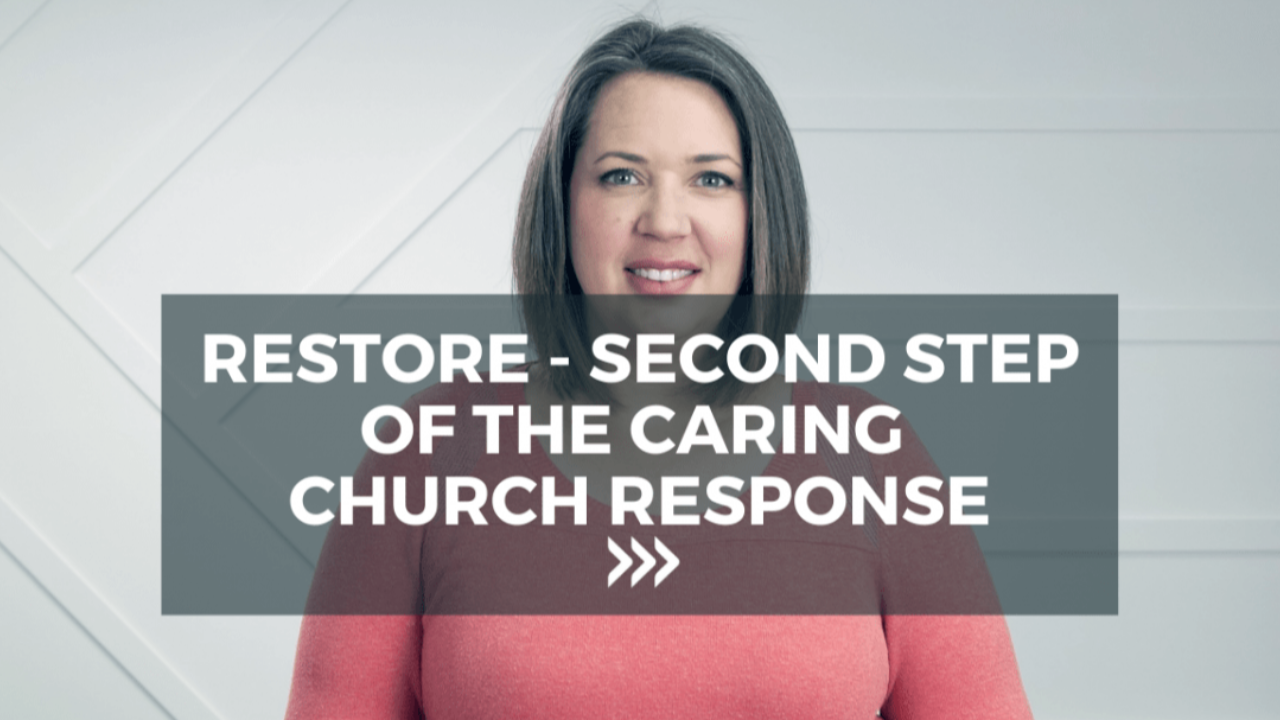RESTORE – THE SECOND STEP OF THE CARING CHURCH RESPONSE
May 16, 2023
Have you ever taken an extra-long weekend to have a mini-vacation? A quick recharge, but not too long because you have a million things going on. You don’t have time for a full vacation, but you know you need a break.
I did this last week and the evening before returning to work I felt more exhausted than when I started our 4-day-weekend. It wasn’t until I stopped that I realized how much I needed a full week (or likely two) off.
Sometimes we don’t realize how weary we are until we stop. The second step of the Caring Church Response is Restore. Taking the time to tend to our needs actually slingshots you further into developing a care ministry that is sustainable and effective.
While on my honeymoon I developed a dozen or more canker sores inside my mouth. We were on a cruise in the southern Caribbean and I wasn’t able to enjoy the incredible food. Thankfully we were able to see the doctor on the ship. He barely had to look at me before he prescribed medication. He said that he sees this all the time. As soon as people relax, a dormant virus that has been suppressed is able to take hold and flares up.
I was shocked! I didn’t realize that I was that stressed. We had a pretty informal wedding, and I didn’t know that my busy schedule was actually keeping viruses at bay.
My new husband jokingly remarked that I need to keep working to stay healthy, but this is often what happens because we can tend to feel worse when we stop, just like I did last weekend.
However, our stress and busy routines aren’t keeping us healthy. They’re actually just masking viruses or issues that are hidden and lying dormant.
In presentations about self-care and resilience, I have often said that you cannot pour from an empty cup. But recently I was challenged by this statement. I saw a post from someone else that said you should pour from an empty cup. “Less of me, more of God”
And that brings up an interesting assumption with the cup analogy. What are the contents of the cup?

The other writer appears to be making the assumption that the cup is full of our own works, ambitions and achievements. I was making the assumption that the contents of the cup were God’s love, grace and gifts/talents. It is striving and serving out of duty that causes cracks in the cup and the contents to leak out.
IT IS THE SECOND STEP OF THE CARING CHURCH RESPONSE, RESTORING, THAT FILLS THE CUP.
We have all served out of duty and added to our already busy schedule because so many people need support. The Spirit may be telling you to rest and refuel, but you feel guilty. People are depending on you and so you agree to add one more thing to your list. The result is often burnout, resentment, exhaustion, and feeling overwhelmed.
In my work with churches, I often see whole volunteer and staff teams in this state of weariness. This can be identified by the first step of the Caring Church Response: Recognize.
Before you can build, develop and create there needs to be restoration.
Matthew 11:28-30 states that when you are weary you need to find rest. Throughout the Bible, we read that our identity is not as burnt-out leaders or resentful volunteers. We are encouraged to be strong and courageous. We are called the workmanship of Christ. We are declared more than conquerors and created in the image of God. We are created to serve.
When we are weary we are none of these things.
Restoration is tending to the needs of your people and leaders so that the cracks in their cups can be repaired and the cups can be filled. Only then can you give out of the overflow.
As a mental health clinician who believes that Jesus is the foundation of true healing, I look for practical strategies that align and lift up the Truth of the word of God. I find this in Resilience. (to learn more about resilience, click HERE)
A restored team with strong resiliency disciplines is a team that flourishes.
It can be tempting to see the needs of your congregation and community and begin to build programs and ministries to meet these needs. But it is vital to pause and restore the weariness of those who serve.
With a hurt, broken and exhausted team, there will be little or short-lived success. Your ministry will not be sustainable. The honeymoon period of a new program will be short-lived: soon the durability of your staff and volunteer teams will wane and resentment will grow.
In Matthew 11:28-30 we are instructed to find rest in Christ, learn from Him, and then the call to service, or the yoke, will be easy and light.
Without first recognizing the signs and symptoms of weariness, and resting with the purpose of restoration, service will feel difficult and heavy.
DIFFICULT AND HEAVY IS NOT WHAT BEING IN SERVICE OF OTHERS IS SUPPOSED TO FEEL LIKE.
I think there is a stigma to feeling weary in ministry. It’s shameful to acknowledge that it’s difficult or that you need a break. Because this is the cross you bear, there’s the impression that to need a break means you are weak or unable to fulfill your calling. At the same time, it’s unacceptable to have boundaries, practice self-care, and have hobbies and fun outside of the ministry.
This makes it difficult to admit that ministry is hard, and you are unable to build resiliency disciplines that make caring for others more manageable.
This is why the second step of the Caring Church Response is so vital. It’s time to break this cultural stigma and restore your spirit, soul, and body.
Taking the time to tend to your needs actually slingshots you further into developing a care ministry that is sustainable and effective. You’re no longer weary and are able to serve out of an abundance rather than scraping the bottom of the cup.
For those who are reading this, I’m sure you can think of a few people who need to hear the message that as a leader in ministry tending to your spirit soul and body is vital. So if the Spirit leads, I encourage you to share this with them and send along a note of encouragement.

